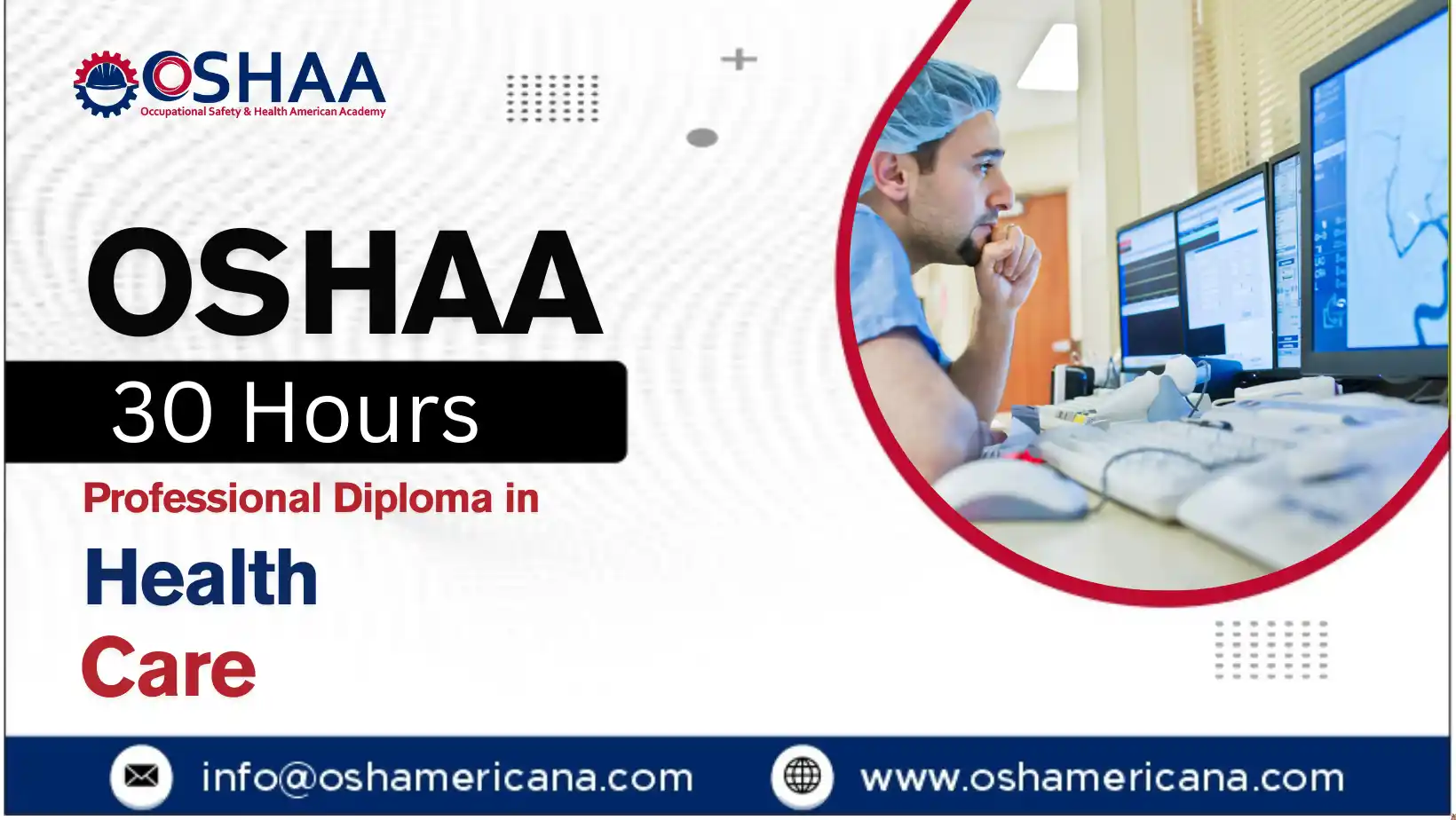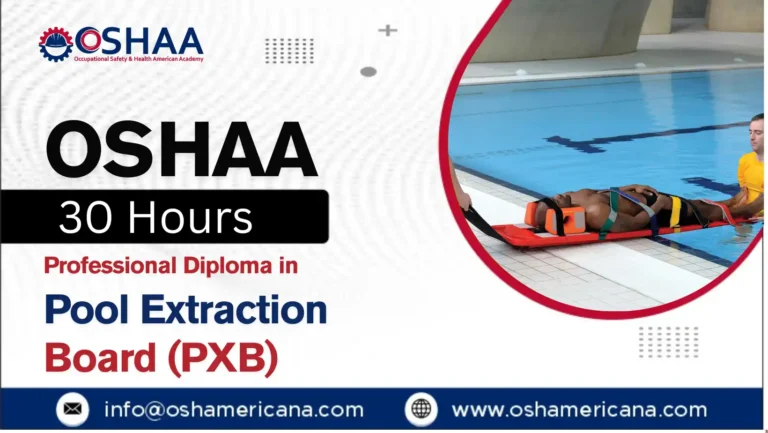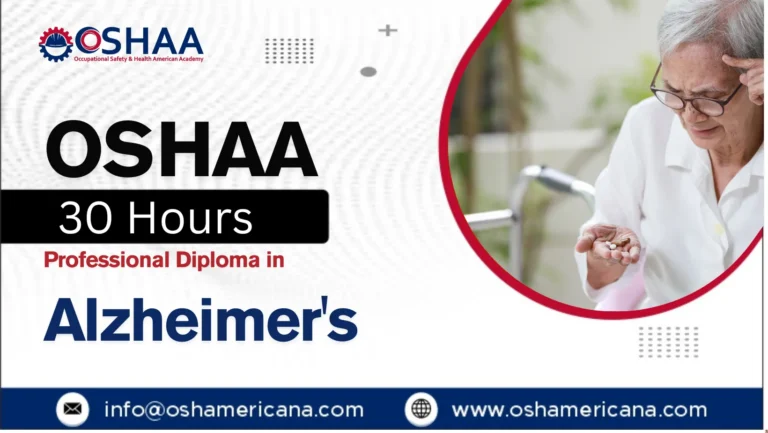The healthcare sector remains one of the most dynamic and high-risk industries, requiring constant vigilance and commitment to health and safety practices. For professionals aiming to enhance their knowledge and build a robust foundation in occupational safety and health, the OSHAA 30-Hours Professional Diploma in Health Care offers an exceptional opportunity.
The OSHAA (Occupational Safety and Health American Alliance) 30-Hours Professional Diploma is a comprehensive training program designed specifically for individuals working in healthcare settings. With an emphasis on safety, compliance, and preventive measures, the course equips participants with critical skills needed to manage risks and promote a culture of safety within their organizations.
In today’s fast-paced healthcare environments, safeguarding staff and patients is not merely a regulatory requirement but a moral and professional obligation. The OSHAA 30-Hours Professional Diploma in Health Care stands as a pivotal qualification for those seeking to lead with safety and uphold the highest standards of care.
Whether you are starting your journey in health and safety or seeking to deepen your expertise, this diploma provides the knowledge and credentials needed to make a tangible difference in your workplace.
OSHAA 30-Hours Professional Diploma in Health Care
Study Units
Learning Outcomes
Introduction to Occupational Safety and Health in Health Care (2 hours)
- Understand the fundamental principles of occupational safety and health within health care settings
- Recognise the importance of creating a safe working environment for patients and staff
- Identify key responsibilities of employers and employees in promoting workplace safety
Hazard Identification and Risk Assessment Techniques (4 hours)
- Identify common workplace hazards specific to the health care sector
- Apply systematic approaches to risk assessment and prioritisation
- Develop and implement appropriate control measures to reduce risk
Infection Control and Bloodborne Pathogens (4 hours)
- Understand modes of transmission for infectious diseases in clinical environments
- Apply standard precautions and infection control practices effectively
- Recognise the importance of immunisation and post-exposure procedures
Chemical and Biological Hazard Management (3 hours)
- Identify hazardous chemicals and biological agents commonly found in health care facilities
- Interpret safety data sheets (SDS) and understand labelling requirements
- Implement appropriate storage, handling, and disposal procedures
Personal Protective Equipment (PPE) and Safe Usage (4 hours)
- Identify the types of PPE used in various health care tasks
- Understand correct procedures for donning, doffing, and maintaining PPE
- Assess the suitability of PPE based on specific workplace risks
Ergonomics and Manual Handling in Health Care (3 hours)
- Recognise ergonomic risks associated with patient care and clinical tasks
- Apply correct manual handling techniques to minimise musculoskeletal injuries
- Promote ergonomic practices and use of assistive devices in the workplace
Fire Safety and Emergency Preparedness (5 hours)
- Understand fire prevention methods and common causes of fire in health care environments
- Respond effectively to fire alarms and implement evacuation procedures
- Participate in emergency drills and develop emergency response plans
Incident Reporting and Accident Investigation (3 hours)
- Identify the importance of timely and accurate incident reporting
- Understand the steps involved in accident and near-miss investigations
- Apply root cause analysis techniques to prevent recurrence of incidents
This course is specifically designed for professionals within the health care sector who are responsible for maintaining a safe and compliant environment.
By completing this diploma, participants will:
- Gain comprehensive knowledge of occupational safety and health principles in clinical settings
- Learn to identify, assess, and control workplace hazards effectively
- Strengthen infection prevention practices and proper use of personal protective equipment (PPE)
- Enhance emergency preparedness and fire safety response capabilities
- Understand legal responsibilities and ensure compliance with health care safety regulations
- Improve incident reporting and investigation skills to reduce risk and recurrence
- Foster a safety-first mindset within their teams and organisations
- Achieve a valuable, internationally recognised qualification for career development
- Increase employability in roles focused on workplace safety and compliance
- Contribute to a safer, more efficient, and patient-centred care environment
This diploma is a smart investment for individuals and organizations committed to excellence in health care safety and operational standards.
The OSHAA 30-Hours Professional Diploma in Health Care is designed for individuals working in or managing health care environments who are responsible for ensuring safety, compliance, and risk management. Whether you are looking to build foundational knowledge or enhance existing expertise, this course offers practical, industry-relevant training tailored to the unique challenges of the health care sector.
This course is ideal for:
- Health and safety officers within hospitals, clinics, or care facilities
- Nursing and clinical staff with supervisory responsibilities
- Health care managers and administrators overseeing workplace safety
- Infection control specialists and compliance personnel
- HR professionals responsible for implementing safety policies
- Facility and operations managers within health care settings
- Individuals seeking to enter the field of health care safety and compliance
No previous safety qualifications are required, making this course accessible to both new and experienced professionals seeking to advance their careers and contribute to safer health care environments.







